5. The Godfather
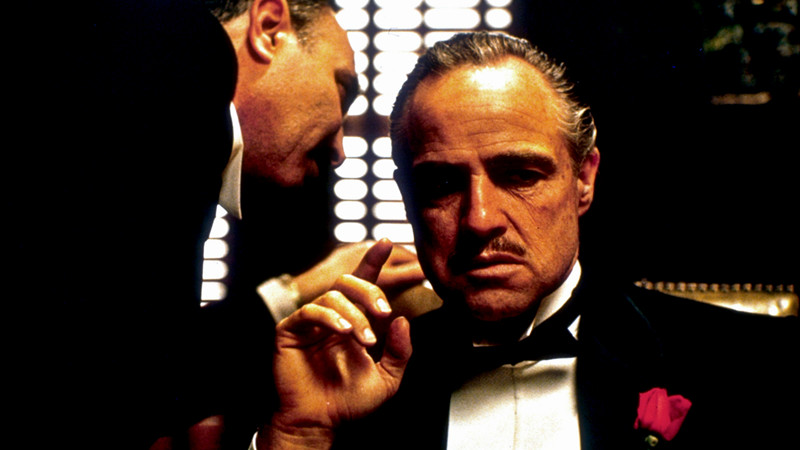
The opening scene of The Godfather is the greatest opening of all time; Francis Ford Coppola uses a mixture of camera movements, blocking, and dialogue to draw you in and hook you; However, while Coppola is certainly the author of this scene as well as the whole film, The Godfather wouldn’t be half as great if even one cast member was changed.
The films cast almost reads as a who’s who of the greatest actors of all time; the cast of the film has won five Oscars collectively, Marlon Brando won twice, Al Pacino, Diane Keaton, and Robert Duvall have all won once, and the fact Sterling Hayden and James Caan haven’t won an Oscar is tragic.
However, while the cast is undeniable the greatest cast ever assembled, the story is what makes the Godfather such a great film; Coppola manages to weave an episodic plot that follows Michael Corleone from the war hero to the godfather.
This works brilliantly because in the beginning, you moral align with Michael in the way he disagrees with what his family does for a living, but slowly, as the plot unravels, Michael begins to change more and more until Michael becomes the new godfather, and you, the audience, who has been following him the whole way realizes by the end of the film that you too could’ve become the new godfather had you been put in the position that Michael was in.
The reason The Godfather is able to do this is the way Coppola seemingly takes you step by step through Michael’s transformation. Coppola allows for every scene to cook awhile which creates a slow paced film, but one that sweeps you up with the narrative; you really comes to terms with the way each generation of a family relates to one another including your own.
You might even realize by the end of the film that you are more like your Michael by following in your parent’s footsteps than you’d like to admit because The Godfather is an exploration of the influence that your family has over you even when you try to be different than them.
4. Taxi Driver
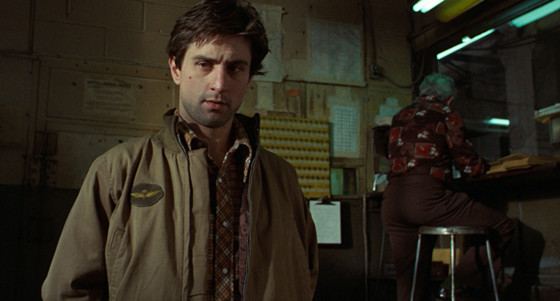
Taxi Driver is a nightmare dressed as a dream which is why the explosive ending hits harder than any other shootout in the history of film. Martin Scorsese manages to craft a masterpiece through lonely nights, long drives, and romantic failures.
It doesn’t hurt that Bernard Herman’s score is a dreamy jazz symphony that is used perfectly to underscore each scene in the film; the opening is a perfect example of how the score adds a dreamy, menacing, and slightly romantic feeling to each scene.
This romantic feeling is perhaps Herman’s attempt to underlie the motivation behind Travis Bickle’s actions when courting Betsy; the most disturbing part about his dates with Betsy is that he genuinely was trying to connect to her.
However, while Travis’ failed romance with Betsy is disturbing, the most disturbing part in Taxi Driver is his relationship with Iris; Travis sees himself as her knight in shining armor when in reality he isn’t the least bit interested in saving Iris as much as he is in killing the men in her life. This is evident in shootout when Travis tries to commit suicide after killing all the men around Iris because he simply has no reason to live after that.
Taxi Driver is haunting in many ways, but the most haunting part is how Scorsese makes you empathize with Travis and his situation because while he is undoubtedly mentally unstable, you wonder if it has to do with his problems he faces everyday. To use a single word to describe Taxi Driver is like using rosebud to describe the life of Charles Foster Kane: both are things to be experienced rather than talked about.
3. 2001: A Space Odyssey
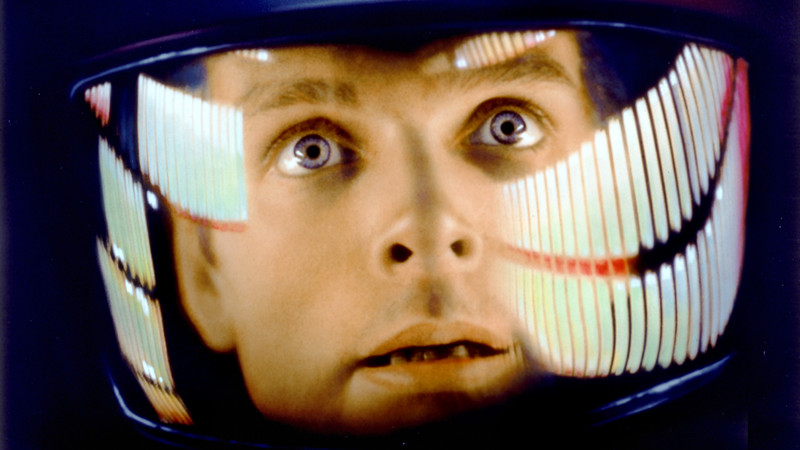
2001: A Space Odyssey is so great that even the overture and intermission are masterpieces as well as nearly every other scene in the film. The Dawn of Man sequence and the Entering Jupiter sequence are among the most memorable; however, the most emotionally charge scene, and possibly the only emotionally charged scene in 2001 is after Dave enters Jupiter and finds himself in a room by himself; he hears noises, decides to check them out, and sees an older version of himself doing something, and this continues until he evolves.
This scene is often times overlooked, but Stanley Kubrick created the greatest metaphor for human life every shot on celluloid; Dave’s life in this room seems to jump ahead much like real life does for your minds because even though you perceive time as linear, you find gaps of time in your life that you hardly remember as you grow older. You grow older slow at first, but time seems to move a little faster with each passing year, and this scene with Dave captures the mortality as the lack of time you have to live.
Many people accuse Kubrick of being cold and unsentimental; however, his detractors misinterpret Kubrick’s objectiveness for coldness because while he was unsentimental, his films, especially 2001, are more humane than almost any other director’s films.
The ending of the film, with a man, Dave, overcoming obstacles and eventually evolving, is arguably the most hopeful ending in the history of cinema because where most films end with hope for the future of the protagonist, 2001 ends with hope for the future of every human.
2. Chungking Express
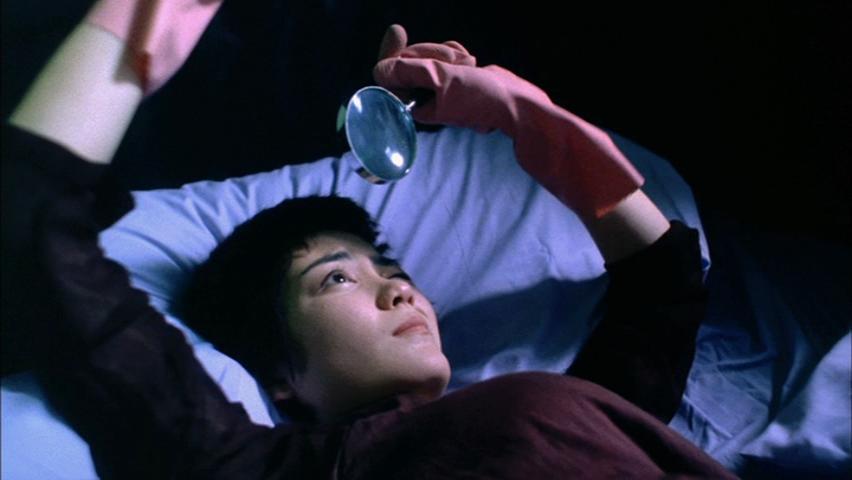
From the opening with the step printing scene of the Woman in the Blonde Wig to the closing shot of a stereo, Chungking Express is an assault on every single one of your senses. The film manages to envelope you, the audience, in the crazy, hectic world of 90s Hong Kong: the consumerism, the bright neon lights, the lonely nights, the drug scene, and the failed attempts at connecting with other people.
Wong Kar-Wai populates the frame with passing faces to create an experience similar to actually living in a big city; these are faces that are never seen a second time, but each face could easily be the lead character in Chungking Express because they’re all moving so fast that their lives are all relatively similar: work, sleep, eat all while trying to connect with people moving just as fast.
This is illustrated perfectly when Wong Kar-Wai switches to the second story; 223 bumps into Faye while she is working, and then the film follows her story almost like saying these characters aren’t anomalies, but rather normalities. Christopher Doyle, Wong Kar-Wai’s usual cinematographer, manages to capture not only the fast pace of Hong Kong, but also the loneliness that big cities are heir to.
One scene in particular where 223 is calling all of his ex-girlfriends on the phone to see if they want to go on a date perfectly captures how unbearable the loneliness is in Hong Kong, but even more so, how difficult it is to escape the loneliness of Hong Kong. Another great scene that illustrates the characters’ inability to connect with each other is when 663 is drinking coffee as Faye is watching him which is all happening in slow motion; this creates a visual metaphor for just how far away someone is mentally when you’re right next to them physically trying to connect with them.
Even though Chungking Express displays the inability of characters to connect with each other, Chungking Express manages to radiate with an abundance of hopeless romanticism that even after a single viewing, you’ll be a hopeless romantic for the rest of your life.
1. Playtime
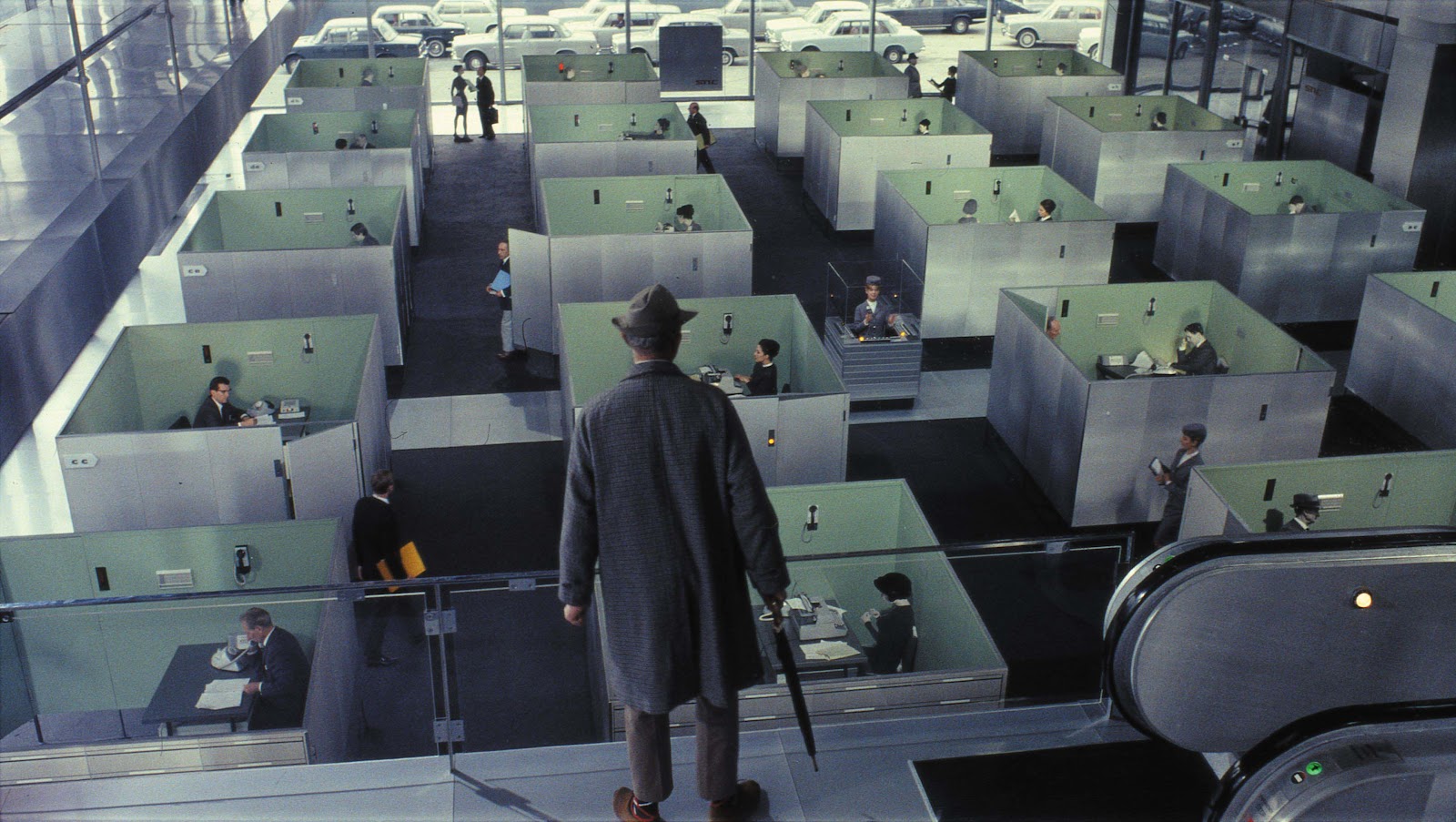
Playtime is the greatest film of all time. It is one of the only film that transcends film itself. You aren’t watching a story unfold; you’re experiencing this world that Tati crafted at your own free will. You can watch the story Tati wanted the audience to follow or you can follow extras as they roam about the city much like you do yourself while watching Playtime.
Tati’s eye for architecture is reminiscent of an Michelangelo Antonioni film except Tati uses the architecture of the city in Playtime to represent the lack of individuality each city will have in the future as shown by the row of posters for each famous city in the ticket exchange.
Another brilliant use of architecture in Playtime is the glass that creates a invisible separation between everyone in the future. The gag in the beginning with the man asking the doorman to light his cigarette to the gag with a different doorman pretending to open a glass door for people; these scenes and several others are representative of the seemingly impersonal relationship everyone has with each other in the film. They may appear to be close or personal, but much like the glass appearing to be invisible so to are the shields that prevent each character from getting in a deep and personal relationship.
Tati’s Monsieur Hulot is the only character who tries to create a meaningful relationship which is fitting because he also seems to be the only one out of place. He is slipping and sliding his way through the city until he stumbles upon Barbra, and he tries his best to woo her, but unfortunately he is too out of place in this version of the future.
Tati’s Hulot is a symbol for the old world that this futuristic world has left behind which might explain why he is the only one breaking the glass because he wants the personal relationships the city deprives itself of. The inhabitants of this city are the faceless many that the audience finds itself among because now that the future has arrived, Playtime doesn’t seem so much like comedy rather than a personal reflection on habits that will ruin our civilization.
There are no politicians in Playtime because Tati is arguing that our desires are to blame for this terrible version of the future that is both hilarious, captivating, and startlingly true.